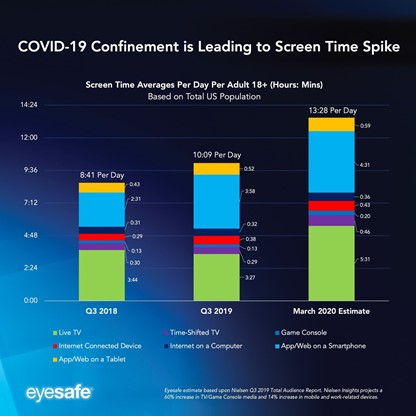Reducing Screen Time to Impact Weight
Why is obesity a problem for so many children? A Closer Look: Screen Time
Today we continue our series on the many contributing factors to childhood overweight and obesity by looking at the role screen time plays. This monthly series will continue throughout 2022 while we shine a light on the impact different behaviors make in weight and health. Previously, we discussed portion sizes and how they have increased in recent years. We showed how eating while watching movies or TV can lead to overeating and missing your body’s cues of fullness. Which leads us to the next topic: screen time. Screen time is not just the time you spend scrolling through social media on your phone- there are many things we may not think of as screen time that can add up. Screen time is any time spent on or in front of a device such as computer, television, tablet, phone, or games console. For example, this graphic shows screen time as live TV, internet connected device, app or web on a tablet, time-shifted TV, internet on a computer, game console or app/web on a smart phone. Unsurprisingly, the COVID-19 pandemic has led to an increase in screen time.

Over the last two years, kids and adults have become accustomed to working from home, meaning laptops and tablets that would have lived at school or at work before the pandemic have been regularly brought home. Even meetings or classes that we might have had in person a couple of years ago are now held on screens. Much of this screen time is unavoidable and in many respects our screens have enabled us to continue our work and studies. Where we run into trouble is the amount of recreational screen time we find ourselves indulging in. Research shows a correlation between excess screen time and higher weights. Too much screen time can impact your overall health in many ways. It can impact your vision, your sleep quality and ability to go to sleep, lead to neck and back pain from bad posture, and even influence your weight.
First, and maybe most importantly, more time spent in front of a screen means less time being physically active. But it’s not just the lack of physical activity that can be bad for you; spending time in front of a screen can impact a child’s health in other areas—especially in younger children. The American Academy of Pediatrics recommends that children under the age of 2 should not be spending any time watching screens at all, as this behavior can be habit-forming and can cause irregular sleep patterns.

Finally, spending time in front of a TV is often associated with snacking, and the distraction of the screen can mean we don’t pay attention to our portions or the nutritional value of our snacks, making it easy to go overboard. The less screen time, the more likely we’ll reduce snacking on empty calories.
There are some small steps that you can take to reduce your family’s screen time. Visit this link here for some tips. And if you’re looking for outdoor activities that you and your family can enjoy, visit here and here and here and here!
A good rule of thumb is the “5-2-1-0” rule. 5 servings of fruits or vegetables, 2 hours of recreational screen time, 1 hour of physical activity and 0 sugary drinks – every day. Screen time is inevitable today, but we can limit our recreational use of screens and reap the benefits!

Topics: 5210, Screen Time
Subscribe for more
Want more ideas for healthy schools, workplaces, child care providers, and families? Subscribe to our blog for weekly tips delivered right to your inbox!
World Obesity Day Is Today NEXT »
With Jump IN's Support, IPS Wins Accolades
